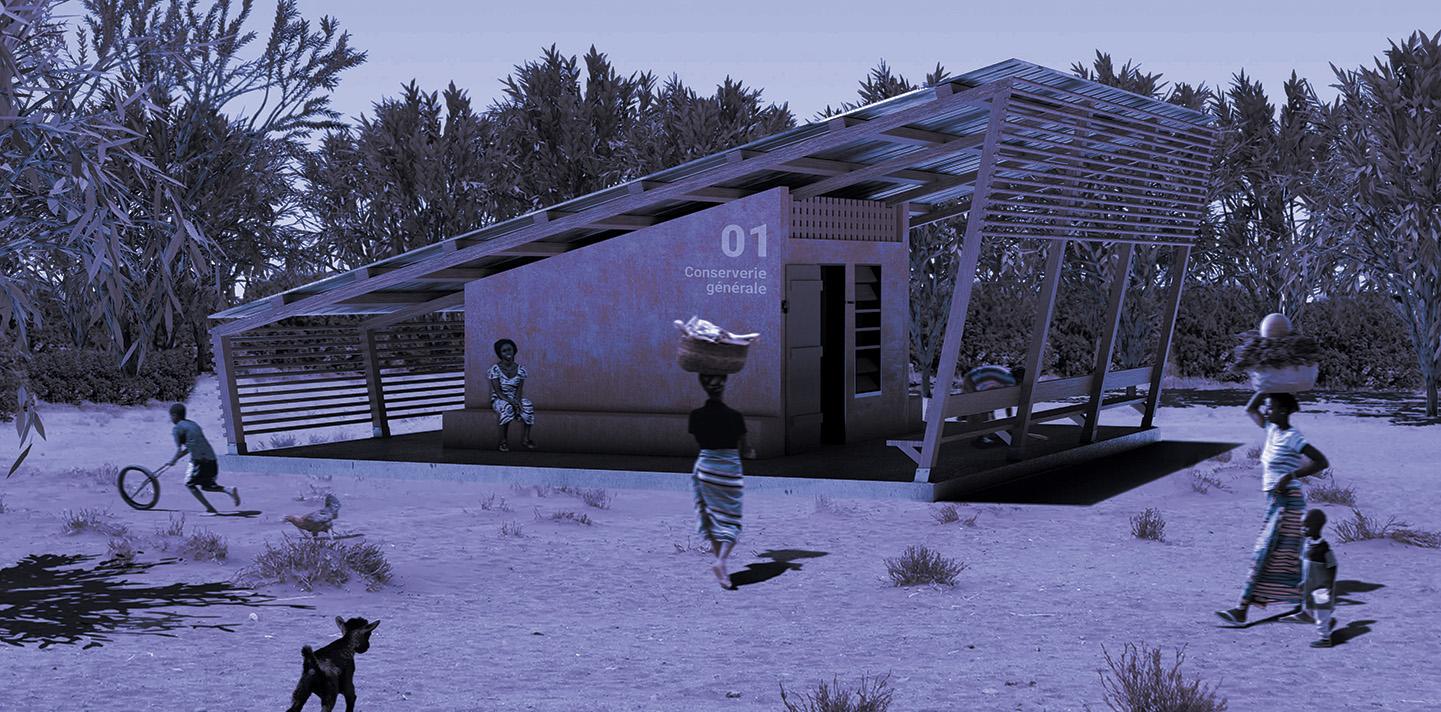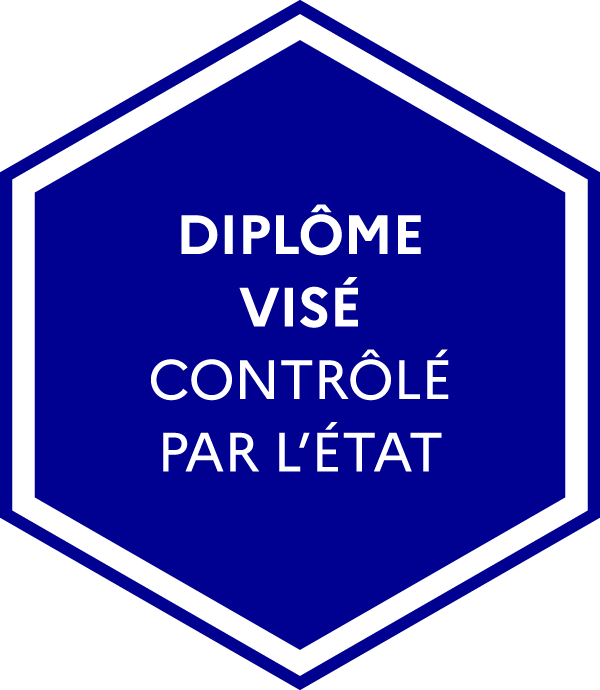

Design Transition[s] Training
2 years to become a strategic designer, capable of providing companies with innovative and responsible solutions in line with the major challenges of today and tomorrow.
Become a Transition[s] designer at Strate School of Design
Be part of tomorrow's changes!
Thanks to a collaborative approach based on ethics and a critical and participatory spirit, designers can help to think up and bring to life proposals that will ensure a sustainable future for humans and the planet.
Designers do more than just imagine or design things. With a global approach, they work on the links that exist between the different ecosystems and fields of application of human experience: living conditions, food, climate, environment, education, health, mobility, etc.
Our Design Transition[s] course will enable tomorrow's designers to understand and rethink these links, placing all living things at the centre of their concerns. They will learn to formulate and formalise a transformative vision to support social, environmental and/or ecological transitions. They will then be able to focus on the conditions under which the world is habitable, on any scale.

Le diplôme de Designer industriel est visé (Bac+5 - Niveau 7) par le Ministère chargé de l'Enseignement Supérieur et de la Recherche [et est enregistré au RNCP sous le numéro 38670].
Titre de Designer Industriel de Strate Ecole de Design Paris et Lyon - niveau 7, enregistré au RNCP sous le numéro 38670 par décision du Directeur Général de France Compétences du 16 février 2023.
6 Reasons for joining the course
The Design Transitions course prepares you to become a global designer, capable of adapting to various fields of design, rather than to a specific niche. With more than 30 years of expertise in design teaching, Strate trains versatile industrial designers, ready to take up the challenges of multiple sectors of activity.
The course focuses on transitions by crossing different disciplines, such as sustainable development, product design and spatial design. This systemic approach enables you to develop an in-depth understanding of contemporary issues and come up with innovative and responsible solutions.
A great opportunity for an international double degree in partnership with the most prestigious design school in China with a worldwide reputation: Tongji University.
It came 11th in the world rankings of the best Art and Design schools (QS Rankings 2024), offering worldwide recognition and unique opportunities to our students.
The international dimension of the course, taught in English, opens the doors to the global job market. Proficiency in technical and professional English is a major asset, making it easier for you to integrate into international companies and projects.
The designer diploma awarded by Strate is recognised by the State and benefits from a visa, guaranteeing its academic excellence. In addition, it is registered in the Répertoire National des Certifications Professionnelles (RNCP), a guarantee of its professional recognition.
Because the Design Transitions course is backed by research, you can stay at the cutting edge of current design issues. Ongoing research feeds into the practice of design, ensuring that your training is in step with the latest innovations and developments in the profession.
Program Transition[s] designer
The first year is structured around partnerships directly related to organizations. This is an opportunity for students to confront the realities of an organization, regardless of its form (business, community, cooperative, etc.). Some subjects include : Scientific culture; living systems; controversies; strategy & transformation; typology of human organisations; foresight
The second year begins with an analysis phase and continues with a design phase, during which the student implements various steps of their diploma project. The project will be presented during the final defense before a panel of professionals. Simultaneously, the student continues to collaborate closely with the professional world by addressing concrete issues for partner organizations. This collaboration may also involve personal or collective initiatives through projects and during their final internship, which has a minimum duration of 4 to 6 months.
A great opportunity for an international double degree in partnership with the most prestigious design school in China with a worldwide reputation: Tongji University.
It came 11th in the world rankings of the best Art and Design schools (QS Rankings 2024), offering worldwide recognition and unique opportunities to our students.
After 2 years of training in Design Transition[s] at Strate School of Design, you can apply to join one of the courses offered by Tongji University for 2 semesters, as part of this double-diploma:
- Product Service System Design
- Advanced Environmental Design
Training objectives
The educational objectives of the Transition[s] Design program are to enable learners to:
- Acquire and master expertise in the main fields of action of transport & mobility design in the face of current and future challenges, thanks to a multidisciplinary team and tailored training and programs,
- Apply a project-based approach thanks to a modular curriculum and flexible teaching methods tailored to real-life issues, including a significant proportion of courses in English,
- Integrate the humanities, social sciences and life sciences, taking a critical look at design to diagnose contemporary dysfunctions,
- Draw on research: benefit from the expertise of a team of researchers to integrate the latest advances in design into the curriculum,
- Adopt an ethical dimension to design, and become aware of the social and environmental responsibilities incumbent on future designers,
- Collaborate with a dynamic ecosystem and interact with a network of partners and companies to orient and enrich training in line with current design requirements.
The Design program aims to train creative and versatile professionals capable of developing innovative solutions across various design fields. Upon completion, students will be able to:
- Implement advanced and specialized uses of digital tools
- Produce and mobilize highly specialized knowledge
- Implement specialized communication for knowledge transfer
- Contribute to transformation in a professional context
- Launch an industrial design project
- Identify and prototype creative solutions
- Design a product based on functional and technical choices
- Manage an industrial design project through to the rendering phase
- Face-to-face courses led by professional lecturers who are experts in their field,
- Simulated and real-life work placements, involving group and/or individual work on real-life orders submitted by partner organizations (companies, associations, local authorities, etc.),
- Individual coaching throughout the course, and particularly in the final year when students specialize and work on their diploma project,
- Empowerment through group work and collaboration, even on individual projects.
- Lectures by specialist speakers on subjects related to the curriculum.
The assessment procedures for the design curriculum are as follows:
- Continuous assessment
- Individual and group project-based assessments: reports and presentations
- Several work placements based on real or fictitious business cases
- Thesis presentation
- Individual end-of-study project, demonstrating the ability to implement a methodological process: investigation, testing, creative iteration, formalization and presentation of the project.
- Internships
Training key figures
29
89%
4/5
*"Strate is a school that stands out for its innovative, practice-oriented teaching. The hands-on projects supervised by professionals allowed me to develop my skills while effectively preparing me for the world of design. The atmosphere is friendly, and the personalized support encourages each student’s growth and creativity.”
Aleksandra G.
Further studies
This program, which grants a level 7 certification, prepares you to enter the workforce at the Bac+5 level. However, if you wish to continue your studies for specialization and attain a higher level of responsibility, you can pursue a doctorate.
Career opportunities
- Strategic designer, service designer, public policy designer, social innovation designer, general interest designer
- Prospective/design manager, radical innovation manager
- RSE project/mission/impact/sustainable development manager
- Strategic design consultant, transition consultant, strategic redirection consultant
- Change facilitator, change manager
- Scientific mediator
Diploma
Designer diploma approved and recognised by the Ministry of Higher Education and Research.
Diploma in Industrial Design from Strate School of Design, level 7, registered with the RNCP under number 38670 by decision of the Director General of France Compétences on February 16, 2023.
Paris campus : 95% of students obtained their diploma - Class of 2024.
Lyon campus : 100% of students obtained their diploma - Class of 2024.
The course does not allow partial validation of one or more blocks.
Each block of skills can be capitalized. Validation of all blocks leads to certification.
To obtain certification, all identified skill blocks must be validated.
No equivalences.
There are no gateways for this diploma.
Admission procedures
Parallel admissions
Would you like to switch to Design after starting or completing a foundation year, an applied arts program, a BTS, IUT, business school or engineering degree?
- Our lateral entry admissions are designed for you. Join our design school directly in the more advanced years of study, bypassing the early stages of a traditional curriculum.
- Our Admissions team will support you throughout the entire process — from exploring your study options, to building your creative portfolio, and preparing for your interview.
Each application is carefully reviewed, taking into account your academic background, creativity, and motivation.
All details can be found on our dedicated page for admissions into Years 2, 3, and 4.
Application period: admissions are open from December to July for the September intake. Applications are reviewed within 1 to 2 weeks after receipt of the complete file. Enrollment remains possible until the official start of the academic year, subject to availability.
By way of exception, registration may still be accepted up to two months after the start of classes, following an individual review of the applicant’s ability to catch up on previously covered coursework.
4th year: €11,190
5th year: €11,190
Application fee¹: €590
Contribution to associative life²: €40
Association Alumni subscription³: €30
Rates applicable for 2026-2027, subject to annual revision.
¹ Only for the year of registration
² Mandatory subscription each year for Strate's associations
³ Mandatory subscription each year for the Strate Alumni
Informations pratiques
Admissions Paris : Contact
Do you have a recognized disability (RQTH) or specific learning needs? Strate is committed to supporting your success, whatever your situation.
An individual meeting will be offered to determine the adaptations and support you may need throughout your studies.
Your contact at Strate Paris:
- Votre contact à Strate Paris : Angélique Vente